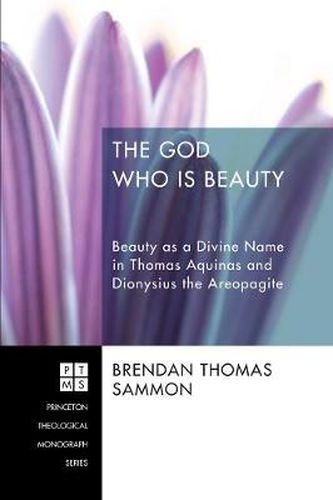Readings Newsletter
Become a Readings Member to make your shopping experience even easier.
Sign in or sign up for free!
You’re not far away from qualifying for FREE standard shipping within Australia
You’ve qualified for FREE standard shipping within Australia
The cart is loading…






This title is printed to order. This book may have been self-published. If so, we cannot guarantee the quality of the content. In the main most books will have gone through the editing process however some may not. We therefore suggest that you be aware of this before ordering this book. If in doubt check either the author or publisher’s details as we are unable to accept any returns unless they are faulty. Please contact us if you have any questions.
When in the sixth century Dionysius the Areopagite declared beauty to be a name for God, he gave birth to something that had long been gestating in the womb of philosophical and theological thought. In doing so, Dionysius makes one of his most pivotal contributions to Christian theological discourse. It is a contribution that is enthusiastically received by the schoolmen of the Middle Ages, and it comes to permeate the thought of scholasticism in a multitude of ways. But perhaps nowhere is the Dionysian influence more pronounced than in the thought of Thomas Aquinas. This book examines both the historical development of beauty’s appropriation as a name for God in Dionysius and Thomas, and the various contours of what it means. The argument that emerges from this study is that given the impact that the divine name theological tradition has within the development of Christian theological discourse, beauty as a divine name indicates the way in which beauty is most fundamentally conceived in the Christian theological tradition as a theological theme. As a phenomenon of inquiry, beauty proves itself to be enigmatic and elusive to even the sharpest intellects in the Greek philosophical tradition. When it is absorbed within the Christian theological synthesis, however, its enigmatic content proves to be a powerful resource for theological reasoning.
$9.00 standard shipping within Australia
FREE standard shipping within Australia for orders over $100.00
Express & International shipping calculated at checkout
This title is printed to order. This book may have been self-published. If so, we cannot guarantee the quality of the content. In the main most books will have gone through the editing process however some may not. We therefore suggest that you be aware of this before ordering this book. If in doubt check either the author or publisher’s details as we are unable to accept any returns unless they are faulty. Please contact us if you have any questions.
When in the sixth century Dionysius the Areopagite declared beauty to be a name for God, he gave birth to something that had long been gestating in the womb of philosophical and theological thought. In doing so, Dionysius makes one of his most pivotal contributions to Christian theological discourse. It is a contribution that is enthusiastically received by the schoolmen of the Middle Ages, and it comes to permeate the thought of scholasticism in a multitude of ways. But perhaps nowhere is the Dionysian influence more pronounced than in the thought of Thomas Aquinas. This book examines both the historical development of beauty’s appropriation as a name for God in Dionysius and Thomas, and the various contours of what it means. The argument that emerges from this study is that given the impact that the divine name theological tradition has within the development of Christian theological discourse, beauty as a divine name indicates the way in which beauty is most fundamentally conceived in the Christian theological tradition as a theological theme. As a phenomenon of inquiry, beauty proves itself to be enigmatic and elusive to even the sharpest intellects in the Greek philosophical tradition. When it is absorbed within the Christian theological synthesis, however, its enigmatic content proves to be a powerful resource for theological reasoning.